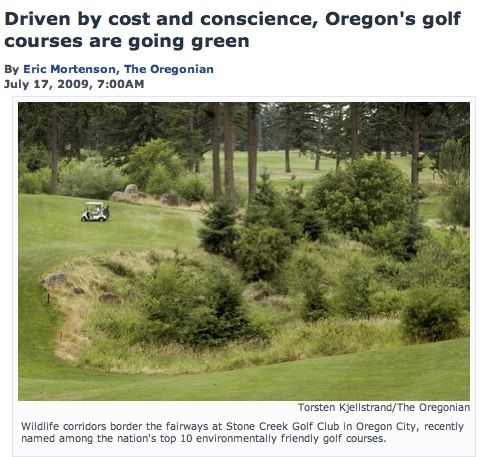Purpose
- Explores and develops market-based solutions.
Summary
Salmon-Safe Golf is the nation’s first certification program linking golf course design and development to the protection of urban water quality and the preservation of an endangered species. The project leverages the Walker Foundation’s earlier investments in Salmon-Safe by extending Salmon-Safe’s innovative market-based program to the West Coast golf industry. The project met all of its startup milestones, including building partnerships with the Pacific Northwest and national golf industry to influence industry practices and successfully piloting the project with golf courses still in design as well as established sites. Like Salmon-Safe Communities, the ecologically sustainable residential development initiative that Walker funded for 2008, Salmon-Safe will be entirely funded by fees to developers beyond this startup phase.

Lead photo from July 17, 2009 article in the Oregonian.
Description
Salmon-Safe Golf has completed its development phase with the preparation of peer-reviewed standards for evaluating golf course site selection, design, development and ongoing management, the introduction of the project in the golf marketplace, the training of a new 4-person independent Salmon-Safe golf course assessment team, and the implementation of three pilot site assessments, including one course in the design phase, the Squaxin Island Tribe’s Salish Cliffs, as well as two long-established public courses, Glendoveer in Portland and Meadow Park in Tacoma. Salmon-Safe Golf was formally unveiled to the Pacific Northwest golf industry at their Vancouver, Washington, meeting in November 2009. Consistent with initial golf industry feedback, Salmon-Safe Golf's key challenge will be our rigorous pesticide use restrictions related to our "High Risk List" of pesticides known to be harmful to salmon and other aquatic life. But the project's initial pilots are helping to make case that a Salmon-Safe golf course is both possible on-the-ground and can provide economic benefits to the landowner, though quantifying operational efficiency, public relations, and even regulatory benefits will be a long-term proposition. As we prepare to announce the first pilot site certifications and roll out the project more broadly in the Pacific Northwest and British Columbia, we anticipate that Salmon-Safe Golf will target the most environmentally innovative golf courses with the goal of redefining “sustainable” industry practices over time. Already, Salmon-Safe Golf has led to new collaboration with the Northwest golf industry, including contributing to their environmental sustainability guidebook for golf courses, and Salmon-Safe presence on the Golf Course Superintendents Association of America’s (GCSAA) environmental practices committee.
Purpose
Like our other Walker Foundation-funded work, Salmon-Safe Golf explores and develops market-based incentives as an alternative to relying on new regulatory mandates to protect imperiled Pacific Coast wild salmon. Salmon-Safe has a dozen-year track record of success in helping to build high value markets for ecologically sustainable farm products. Salmon-Safe Golf will deliver similar marketplace benefits to developers that invest in fish-friendly site design and management. As a measure of Salmon-Safe's stature as an alternative to new regulatory measures, Salmon-Safe certification was formally incorporated by NOAA Fisheries in the 2007 federal "Shared Strategy" recovery plan for endangered Puget Sound salmon as the primary voluntary incentive for private landowners. Salmon-Safe now is working with NOAA to explore incorporating Salmon-Safe certification in new federal recovery strategies in the mid-Columbia Basin and Willamette Valley with the goal of providing non-regulatory incentives to landowners that voluntarily conserve native fish.
Scope
Even beyond the West Coast, Salmon-Safe Golf already is having national impact as Salmon-Safe has been invited to participate on the Golf Course Superintendents Association of America’s (GCSAA) environmental practices committee. As more courses achieve Salmon-Safe certification, the project has the potential to significantly redefine sustainable golf course management beyond landscape management practices to protecting native biodiversity and urban watersheds. In the same way, the project's market-based model is likely to be replicated by other organizations to engage the golf industry in other regions in ecologically sustainable golf course management. Salmon-Safe Golf, like our other programs, will be developed so that it can be applied in any watershed where landowners are seeking non-regulatory solutions to water quality and endangered species issues.
Information Dissemination
Project results and findings are being disseminated by Salmon-Safe and our partners through presentations to the Northwest golf industry. The project also is featured on the all-new Salmon-Safe web site.
Project Link http://www.salmonsafe.org/getcertified/golf-courses
Amount Approved$25,000.00
on 6/24/2009
(Check sent: 7/24/2009)